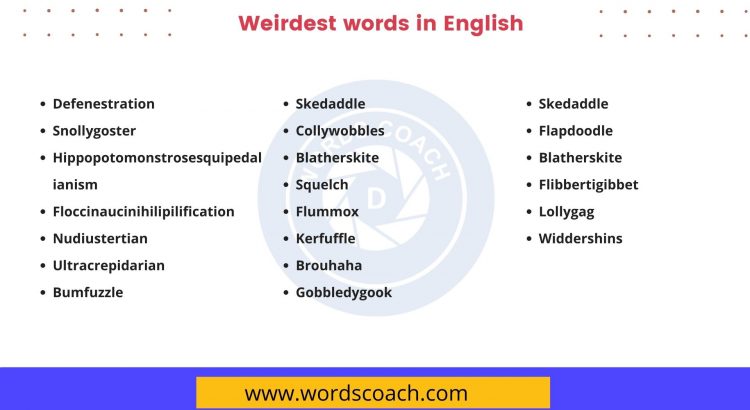Weirdest words in English
English is a language full of surprises, and sometimes, even native speakers can come across words that leave them scratching their heads. As a result, it’s not surprising that there are some words that are downright weird and quirky. From archaic terms to strange-sounding words, here are the weirdest words in the English language.
Defenestration – This mouthful of a word refers to the act of throwing someone or something out of a window. It comes from the Latin word “fenestra,” meaning “window.”
Snollygoster – A snollygoster is a shrewd or unprincipled person, especially a politician. The origin of this word is uncertain, but it’s believed to have originated in the United States in the mid-19th century.
Hippopotomonstrosesquipedalianism – This tongue-twister of a word refers to the use of long words, and ironically, it’s one of the longest words in the English language.
Floccinaucinihilipilification – Another mouthful, this word refers to the act of describing something as worthless or unimportant.
Nudiustertian – This archaic term refers to the day before yesterday.
Ultracrepidarian – An ultracrepidarian is someone who speaks or gives opinions beyond their expertise or knowledge.
Bumfuzzle – To be bumfuzzled is to be confused, bewildered, or perplexed.
Skedaddle – To skedaddle is to run away or leave in a hurry.
Collywobbles – The collywobbles are a feeling of queasiness or discomfort in the stomach, often associated with anxiety or nervousness.
Blatherskite – A blatherskite is a person who talks excessively or nonsensically.
Squelch – This word refers to a wet, sucking sound that is made when you walk through mud or waterlogged ground.
Flummox – Flummox means to confuse or perplex someone, often by presenting them with a problem that is difficult to solve.
Kerfuffle – Kerfuffle is a word that is used to describe a commotion or fuss that is caused by a minor disagreement or misunderstanding.
Brouhaha – Brouhaha is another word that is used to describe a noisy and overexcited response to something that is often trivial or unimportant.
Gobbledygook – Gobbledygook refers to language that is meaningless or unintelligible, often used to describe bureaucratic jargon or technical language.
Skedaddle – Skedaddle is a word that means to run away quickly or leave a place in a hurry.
Flapdoodle – Flapdoodle is a term that is used to describe nonsense or foolish talk.
Blatherskite – Blatherskite is another word that means someone who talks nonsense or foolishly.
Flibbertigibbet – Flibbertigibbet is a word that is used to describe a frivolous or flighty person, often someone who talks too much.
Lollygag – Lollygag means to spend time aimlessly, often in a lazy or idle manner.
Widdershins – Widdershins is a word that means to move in a counterclockwise direction, or to go against the usual way of doing things.
English is a rich and complex language, and these words are just a small sample of the many weird and wonderful words that exist. Whether you’re a native speaker or a non-native speaker, exploring the strange and unusual words of the English language can be a fun and entertaining way to improve your vocabulary and expand your linguistic horizons.





